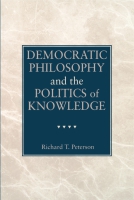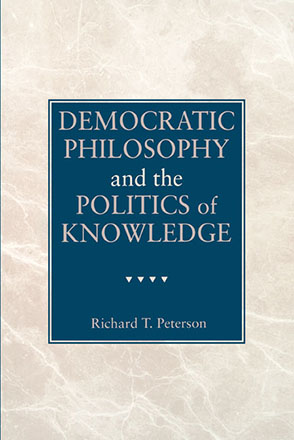Democratic Philosophy and the Politics of Knowledge
Richard T. Peterson
“This rigorously argued and well-organized book is an extremely impressive attempt to produce a democratic philosophy that is rigorous and compelling. During an era in which postmodern theorists are attempting to undercut some of the premises of democratic philosophy—just at the moment when the democratic revolution is appearing to triumph politically on a world-scale—it is heartening to see someone like Peterson commit himself to developing a serious democratic philosophy.”
- Description
- Reviews
- Bio
- Subjects
Engaging thinkers as diverse as Kant, Hegel, Marx, Habermas, Foucault, and Bahktin, Peterson argues that a democratic conception and practice of philosophy is inseparable from democracy generally. His arguments about modern philosophy are tied to claims about the relation between liberalism and epistemology, and these in turn inform an account of impasses confronting contemporary politics. Historical arguments about the connections between postmodernist thought and practice are illustrated by discussions of the postmodernist dimensions of recent politics.
“This rigorously argued and well-organized book is an extremely impressive attempt to produce a democratic philosophy that is rigorous and compelling. During an era in which postmodern theorists are attempting to undercut some of the premises of democratic philosophy—just at the moment when the democratic revolution is appearing to triumph politically on a world-scale—it is heartening to see someone like Peterson commit himself to developing a serious democratic philosophy.”
Richard T. Peterson is Professor of Philosophy at Michigan State University. He is the co-editor of Philosophy, Children and the Family (1980).
Mailing List
Subscribe to our mailing list and be notified about new titles, journals and catalogs.




